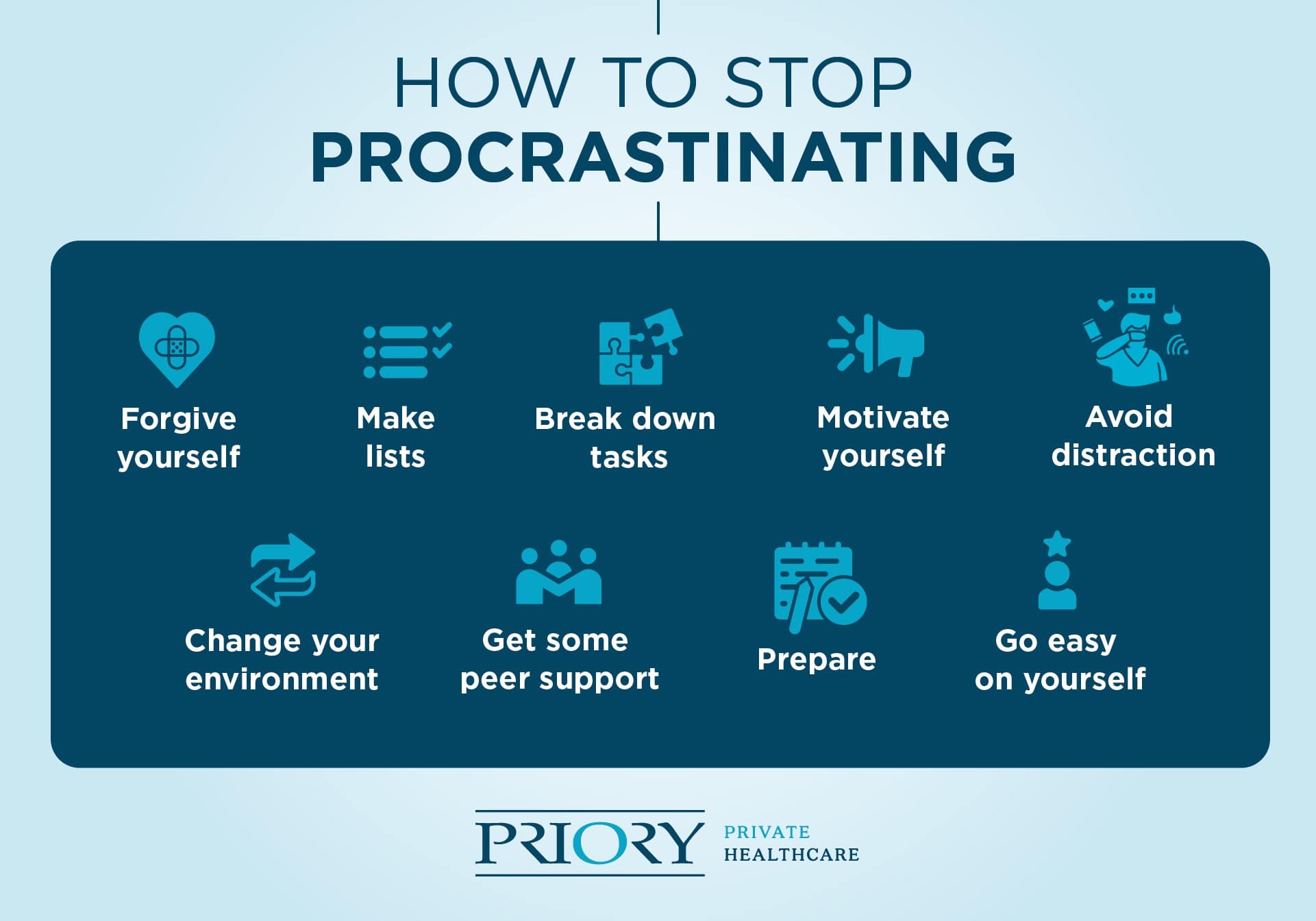Procrastination-Busting Strategies: How to Overcome Delay and Boost Productivity
Procrastination—we all experience it, but few fully understand its impacts. It’s a natural tendency to delay tasks, and while it may feel temporary or harmless, procrastination can significantly harm your productivity, stress levels, and even your career or personal goals. The good news is that overcoming procrastination is not impossible. With the right strategies, you can break free from this cycle and boost your efficiency, creativity, and overall well-being.
In this comprehensive guide, we’ll explore procrastination-busting strategies that can help you take control of your tasks, increase productivity, and reduce stress. Whether you’re struggling with work, study, or personal projects, these strategies will help you get back on track.

What is Procrastination?
Procrastination is the act of delaying or postponing tasks despite knowing the potential negative consequences. It’s often rooted in fear, lack of motivation, or a desire to avoid discomfort. It can manifest in various ways—from scrolling through social media instead of completing a report to avoiding a workout because of mental barriers.
Although procrastination is a natural human tendency, persistent procrastination can become a significant barrier to achieving your personal and professional goals. It can lead to stress, anxiety, and lowered self-esteem when you consistently fail to meet deadlines or accomplish tasks.
Why Do We Procrastinate?
Understanding the root cause of procrastination is essential to tackling it effectively. Here are some common reasons we procrastinate:
1. Fear of Failure or Perfectionism
Many people procrastinate because they fear not being able to do something perfectly. This fear of failure can be paralyzing, making it harder to get started on tasks.
2. Lack of Motivation
When a task feels overwhelming or boring, we often lack the drive to begin. Without clear goals or excitement about the task, it’s easy to delay it.
3. Overwhelm
Large projects or tasks that seem too daunting can lead to procrastination. The feeling of being overwhelmed by the amount of work can make it hard to even get started.
4. Distractions
With the constant availability of social media, entertainment, and even everyday chores, distractions can be a major cause of procrastination.
5. Low Energy or Fatigue
Being tired or mentally drained can contribute to procrastination. Sometimes, it’s easier to avoid work than to face it when your energy levels are low.
Effective Procrastination-Busting Strategies
Now that we understand why we procrastinate, let’s look at some actionable strategies that can help overcome it and boost your productivity.
1. Break Tasks Into Smaller, Manageable Steps
One of the most effective ways to beat procrastination is by breaking down overwhelming tasks into smaller, more manageable steps. When a task seems too large, it’s easy to put it off. But if you can focus on completing one small part at a time, you’ll feel less intimidated and more motivated to continue.
For example, instead of saying, “I need to write a 10-page report,” try breaking it down into smaller tasks like:
- Research 1 hour
- Write an outline
- Write the introduction
- Write two body paragraphs
By tackling one small task at a time, you’ll build momentum and feel more accomplished.
2. Use the Two-Minute Rule
The two-minute rule is a simple yet powerful way to overcome procrastination. The idea is that if a task will take two minutes or less, do it immediately. This prevents small tasks from piling up and overwhelming you. By taking quick action, you also create a habit of tackling things right away instead of putting them off.
For example, if you need to reply to an email, don’t wait. Respond immediately, even if it’s just a quick acknowledgment. You’ll find that the small tasks won’t feel as burdensome, and you’ll develop a habit of getting things done quickly.
3. Set Clear, Achievable Goals
Setting clear, achievable goals is crucial to overcoming procrastination. When you have a specific goal in mind, it’s easier to stay focused and motivated. Use the SMART goal framework—which stands for Specific, Measurable, Achievable, Relevant, and Time-bound—to create goals that are clear and actionable.
For example, instead of saying, “I want to exercise more,” a SMART goal would be, “I will walk 30 minutes every morning at 7 AM for the next 7 days.”
4. Eliminate Distractions
If you find yourself procrastinating due to distractions, it’s essential to eliminate or limit them. Here are a few tips:
- Turn off notifications on your phone or computer.
- Create a dedicated, quiet workspace where distractions are minimized.
- Use apps like Freedom or Focus@Will that block distracting websites and apps while you work.
By reducing distractions, you’ll be able to focus more on the task at hand and avoid falling into the procrastination trap.

5. Use Time Blocks (Pomodoro Technique)
Time blocking is a technique that involves dedicating a specific block of time to work on a single task, followed by a short break. The Pomodoro technique is one of the most popular methods for time blocking.
The Pomodoro technique works as follows:
- Set a timer for 25 minutes and focus solely on one task.
- After the 25 minutes, take a 5-minute break.
- Repeat this cycle for four Pomodoros, and then take a longer break (15-30 minutes).
This method helps maintain focus and prevents burnout, making it easier to push through procrastination.
6. Practice Self-Compassion
If you fall into the trap of procrastination, don’t beat yourself up. Practicing self-compassion is essential for overcoming procrastination. Recognize that everyone struggles with procrastination at some point, and it’s okay to make mistakes.
Instead of feeling guilty or frustrated with yourself, focus on getting back on track. Being kind to yourself will make it easier to move forward and regain motivation.
7. Reward Yourself for Small Wins
Rewarding yourself after completing a task, even a small one, is a great way to stay motivated. Positive reinforcement helps reinforce productive behaviors and reduces the temptation to procrastinate.
For example, after completing a task, treat yourself to something you enjoy, whether it’s a snack, a short walk, or 15 minutes of your favorite TV show.
8. Understand the Root Cause
Sometimes, procrastination is a sign of deeper issues like fear of failure, lack of confidence, or burnout. If you find yourself procrastinating repeatedly, take a step back and examine why this is happening. Understanding the underlying cause can help you address the issue more effectively.
If you need additional support, consider speaking to a therapist or coach who can help you explore the root causes of procrastination.
How to Stop Procrastinating: A Step-by-Step Guide
Here’s a simple guide to help you get started on overcoming procrastination:
- Identify the Task: What task are you procrastinating on?
- Break It Down: Divide the task into smaller, manageable parts.
- Set a Time Limit: Use time blocking or the Pomodoro technique to set focused work periods.
- Remove Distractions: Turn off notifications and create a distraction-free workspace.
- Take Action: Begin with a small, easy task to build momentum.
- Reward Yourself: Celebrate your progress with a small reward.
9. Practice Mindfulness and Meditation
Mindfulness and meditation can help calm the mind and reduce feelings of anxiety or overwhelm. By practicing mindfulness, you can become more aware of when you’re procrastinating and can take immediate steps to redirect your focus.
Studies show that mindfulness practices can improve productivity, reduce stress, and enhance focus.

Frequently Asked Questions (FAQs)
1. How do I stop procrastinating on big projects?
To stop procrastinating on big projects, break them down into smaller, manageable tasks. Set specific goals and deadlines for each part of the project and focus on completing one task at a time.
2. Can procrastination be a sign of something deeper?
Yes, chronic procrastination can sometimes indicate underlying issues such as fear of failure, perfectionism, or low self-esteem. If procrastination is persistent, consider talking to a professional to explore these deeper issues.
3. How can I stay motivated when I don’t feel like working?
One way to stay motivated is to reward yourself for completing small tasks. You can also remind yourself of the long-term benefits of completing the task, which will help you stay focused.
4. What if I don’t have the energy to tackle tasks?
If you’re feeling drained, try to manage your energy levels through self-care. Take breaks, get enough sleep, and practice relaxation techniques to recharge your body and mind.
Conclusion
Procrastination is a common challenge, but with the right strategies, you can break free from its grip and become more productive, focused, and efficient. By incorporating time management techniques, eliminating distractions, and addressing the root causes of procrastination, you can develop a healthy relationship with your tasks and
start achieving your goals.
Remember, progress is about taking small, consistent steps, so don’t be discouraged if you don’t see immediate results. Keep applying these strategies, and soon, procrastination will become a thing of the past!

